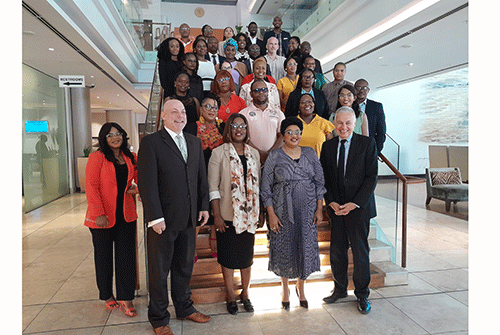It is better to be cautious of any unscheduled contact to avoid disappointment, particularly at this time of the year when scams and fraud are known to escalate during the build-up to the festive season. This was part of the message yesterday by deputy trade minister, Verna Sinimbo, at the launch of a consumer protection workshop in the capital.
The workshop is being held by the trade ministry as they aim to protect consumers against unfair, dishonest, and fraudulent business practices before appropriate legislation is developed.
The trade ministry has partnered with the US Federal Trade Commission (USFTC) for the three-day workshop.
“It is best to be suspicious of any contact you were not expecting. Taking time to consider an offer could be the difference between being caught in a scam and avoiding it. If you think it is a scam, it is probably a scam, so it is best to approach the necessary authorities to satisfy yourself before you act,” said Sinimbo while officially opening the workshop.
The event, which ends on Friday, brings together around 50 attendees and representatives from South Africa, Botswana, and Zambia for an overview of the history and current legal framework for consumer protection in the Southern African Development Community (SADC) region.
Additionally, the workshop, taking place under the theme “Consumer Protection and E-commerce”, aims to demystify the evolution of consumer protection legislation considering Namibia’s current framework for consumer protection, reform prospects and legal reform as well as emerging trends in consumer protection in southern Africa.
According to the deputy minister, Namibia currently has a National Consumer Protection Policy, but she added the country is taking notable strides towards ensuring that it has a Consumer Protection Act in place in the shortest timeframe possible.
Boosted by the restrictions of the Covid-19 pandemic, Sinimbo noted it is now clear that e-commerce is the new norm in terms of doing business.
“As a result, it is incumbent upon us as consumer protection authorities to recognise the challenges and take steps to protect our consumers as they continue to embrace new ways of operating within the market space,” said Sinimbo.
Meanwhile, financial services are evolving rapidly, with a growing array of new technologies, unconventional providers, and innovative combinations of financial and non-financial services.
While this evolution can help enhance financial inclusion for vulnerable consumers, it also brings greater risks.
“There is evidence that digital finance consumer risks, such as data misuse and fraud, have increased in several markets over the last few years. Crises such as the Covid-19 pandemic have exacerbated these risks, as vulnerable groups are more fragile due to economic hardships,” the deputy minister stated.


